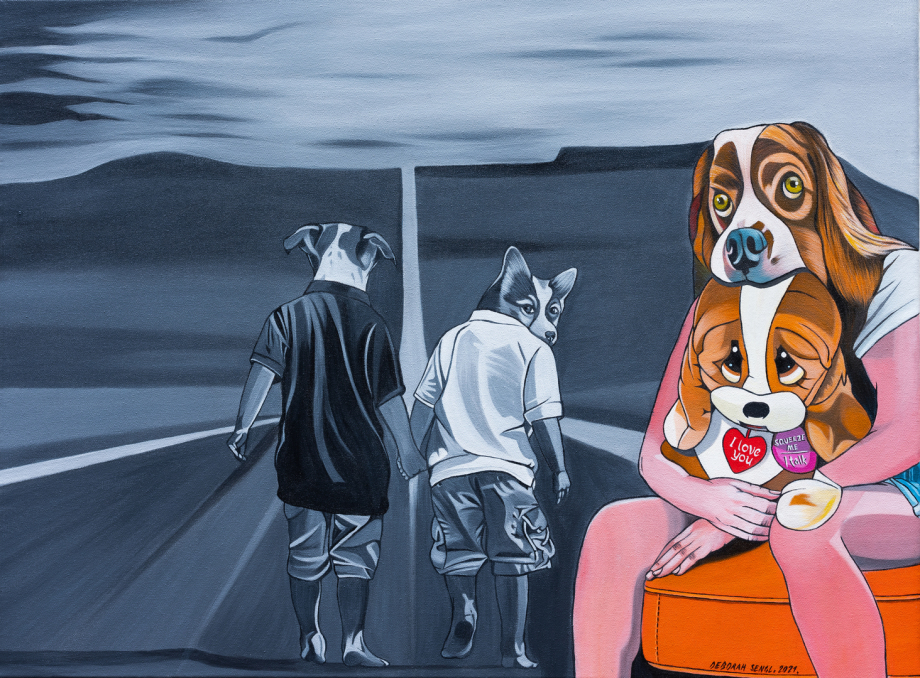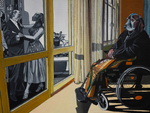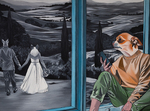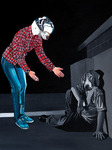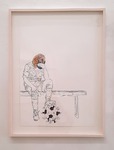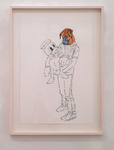10.09. - 08.10.2022
Deborah Sengl. Shades of Gray
Schon in der vorangegangenen Serie „Coro(h)na“ (2020/21) beschäftigte sich Deborah Sengl mit den gesellschaftlichen Auswirkungen der
Covid-Pandemie, speziell der damit verbundenen Zwangsisolation, die viele Menschen unvorbereitet mit dem Gefühl der Einsamkeit konfrontierte. „Coro(h)na“ verdeutlichte durch die Aussparung nicht
anwesender Mitmenschen das soziale Defizit.
„Shades of Gray“ kann als Fortsetzung dieser Serie verstanden werden. Zwar könnte man meinen beziehungsweise hoffen, dass die Zeit
der Entbehrungen hinter uns liegt, doch die sogenannte neue Normalität kann nicht nahtlos an unsere alten Gewohnheiten anknüpfen. Zwei Jahre der Abschottung und Angst haben viele von uns nachhaltig
verändert. Zusätzlich hat sich ein Krieg in Europa aufgetan, der nicht nur unzählige Opfer fordert, sondern uns alle einer ungewissen Zukunft entgegensehen lässt. Idealerweise lässt sich aus dieser
Krise lernen. Es ist aber nachvollziehbar, dass vielen momentan dafür die Kraft und die Zuversicht fehlt und der Blick zurück in unbeschwerte(re) Zeiten an Bedeutung gewinnt. Dies aber nicht nur im
sentimentalen Sinne: Das Erkennen der besonderen Menschen und Momente mag uns womöglich auch lehren, den eigentlichen, gegenwärtigen Reichtum unseres Lebens wirklich zu schätzen.
In her previous series "Coro(h)na" (2020/21), Deborah Sengl already dealt with the social effects of the Covid pandemic, especially
the forced isolation that confronted many people with a loneliness for which they were unprepared. "Coro(h)na" highlighted the social deficit by omitting fellow people who were not
present.
"Shades of Gray" can be understood as a continuation of this series. While one might think or hope that the time of austerity is
behind us, the so-called new normal cannot seamlessly pick up where our old habits left off. Two years of isolation and fear have permanently changed many of us. In addition, a war has opened up in
Europe that is not only claiming countless victims, but leaves us all facing an uncertain future. Ideally, lessons can be learned from this crisis. However, it is understandable that many people
currently lack the strength and confidence to do so, and that nostalgia for more carefree times is growing. But this need not be purely sentimental: recognizing special people and moments may also
teach us to truly appreciate the real wealth we have in our lives now.
UPCOMING:
TINA RIBARITS. Electric Entity
September 14 - October 25, 2024
VIENNACONTEMPORARY
Ulrike Königshofer, Tina Ribarits
September 12-15, 2024
NEW ADDRESS!
Getreidemarkt 14
A-1010 Wien / Austria
office[a]agnesreinthaler.com
Summer break till Sept 13, 2024
Open on appointment only
Sign up for the gallery newsletter
Please note that we are not accepting unsolicited artist submissions.
UID: ATU66256008
FN 357375b

